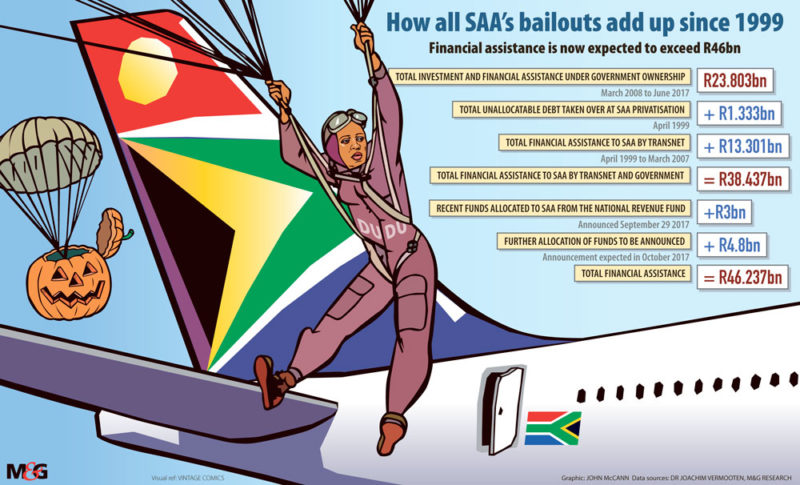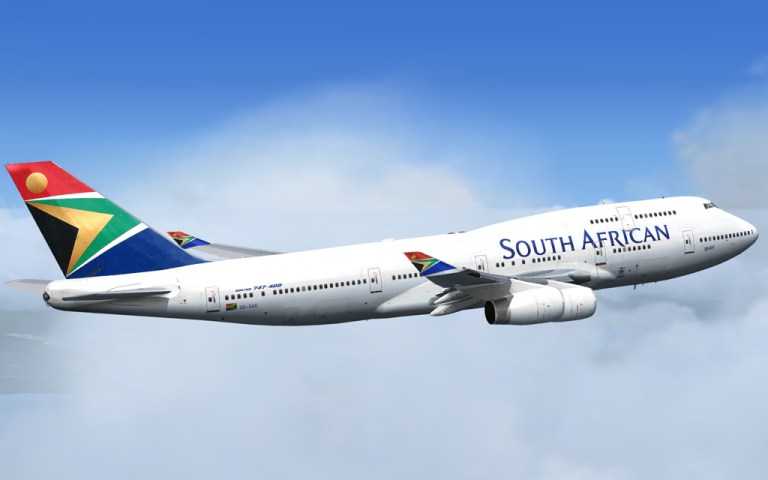SAA (South African Airways) is paying three times as much for the leasing of aeroplanes as other airlines because the extra money is disappearing into the pockets of managers’ friends and so-called “BEE beneficiaries”. The latter abbreviation refers to “Black Economic Empowerment” which denotes the country’s extreme forms of affirmative action and “majority procurement” that require companies to hand over chunks of equity or otherwise prohibit them from procuring goods and services from white-owned companies.
The million litres of fuel bought by the airline every day, is not procured at market prices either because a supplier has to add his “commission” to the price.
FreeWest spoke to sources deep within the struggling state-owned airline which is in need of almost constant bailouts by the state. While Ethiopian Airlines has dethroned SAA as “best airline in Africa”, it does not look as if the local airline is ever going to overcome its problems, which include the billions of rands in cash disappearing down its financial black hole.
South African media have chronicled the soap opera of SAA and its arrogant, highly-paid all-black executive staff, including chairwoman Dudu Miyeni who is reputedly on exceptionally good terms with the South African president, Jacob Zuma. Apart from her duties as chairwoman of SAA, she is also “Executive Chairperson of the Jacob G Zuma Foundation”.
According to one of FreeWest’s sources, someone who has worked at SAA for years, Black Economic Empowerment is the root of the problem. “BEE is actually just an excuse for theft,” said the source. “Unlike any normal airline elsewhere in the world, we are not allowed to purchase our aeroplanes or fuel from reputable suppliers; everything must go via BEE entities or intermediaries that are sucking us dry like leeches.”
Prior to the ANC takeover of South Africa in 1994, SAA was administered as a national asset. Even directors of SAA enjoyed a middle-class lifestyle in those days, with their children in state schools and earning a manager’s salary with which a middle-class home and car could be afforded.
“A director of SAA today lives in a sixteen-million rand home in Sandhurst (one of Johannesburg’s most expensive suburbs with huge mansions) and drives at least a Porsche,” said the source. “He earns four million a rand a year and lives like a king. Accordingly, the airline is in dire straits.
“Normally it costs about $300 000 per month to lease a big passenger aircraft for international flights; that is what most airlines would pay. However, until recently SAA was paying $900 000 per month per aeroplane, because all the intermediaries and BEE looters had to be fed. These lease agreements have in the meantime been revised downwards, but are still more expensive than the norm.”
At one time SAA had its own aeroplanes, among others a whole fleet of Boeing 747s. “Those planes were all fully paid!” said the source. “They only needed to be maintained. But then we were told: no, we can’t be profitable with old planes. We had to get new ones, lease new ones. Those Boeings were sold off for a pittance, again by intermediaries who made money…”
That the Boeings were no longer suitable was a lie. “SAA can no longer make a profit with any aeroplane. But British Airways, Quantas, they still fly to South Africa every day with Boeing 747s! They somehow manage to get a profit out of their planes.”

A cartoon and graph from the Mail & Guardian, a South African weekly, totalling the bailouts received by SAA to date.
More and more routes are being closed, again because “they are not profitable”. Yet other airlines find the same routes profitable, it is only SAA with its heavy ballast of BEE looters who can no longer afford them.
According to the source, “SAA will need another five billion rand soon, just to keep going. As long as these practices are tolerated and as long as BEE exists, the state is going to have to support SAA,” said the source.
It is about more than bad management. The whole system of “empowerment” and legalised theft is making it impossible to manage an airline according to business principles.
Ethiopian Airlines is making a profit of $300 million per year, probably with less profitable routes to those of SAA. This airline is also government-owned. “The difference is,” said the source, “that the Ethiopian government appointed a CEO that manages the airline in the interest of the shareholder, the state. What he says goes. There is no government interference in the airline. Unlike SAA, where the minister and the state are constantly interfering.”

















